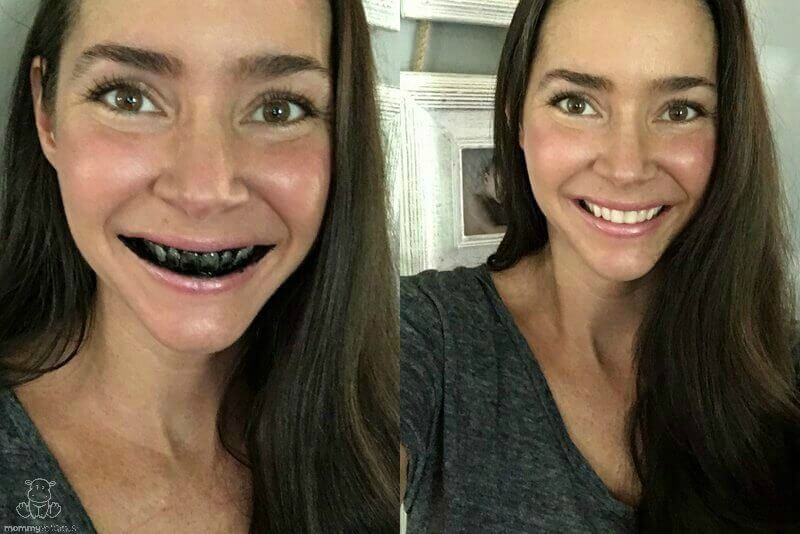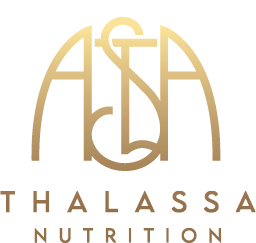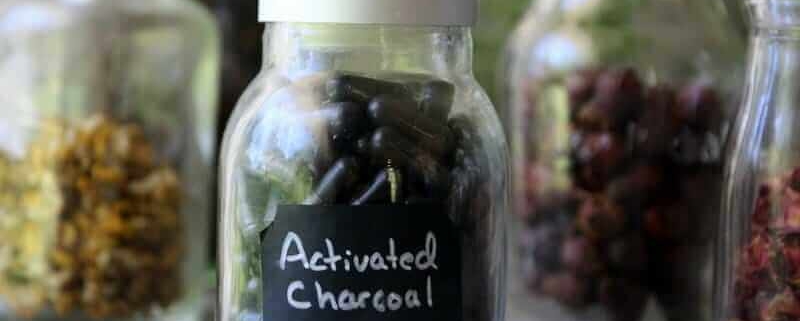Awesome Uses For Activated Charcoal
Imagine this: You’ve got one hour to pack for your dream vacation, and all you can take with you is a carry on – what do you toss in your bag? I can tell you one item that would definitely be in mine, whether I’m headed to Iceland’s hot springs or a beach in Bali. Activated charcoal.
Activated charcoal is basically the Swiss Army knife of natural living – one bottle serves as first aid, a portable spa treatment, and tooth whitener. And those are just a few of it’s uses. (Coconut oil, honey and apple cider are also multi-purpose. We’ll cover them in another post!)
What is activated charcoal?
This is not the stuff you throw in your BBQ grill to make dijon rosemary marinaded shish kabobs. Activated charcoal is made by burning natural materials – sometimes hardwood or coconut shells – until they transform into a highly adsorbent powder or granules. Now, you know what ABsorption is – when fluid is dissolved into a liquid or solid, like water being absorbed by a paper towel.
ADsorption is a little different – think of it more like a magnet binds strongly to the surface certain substances, grabbing onto them so they can’t get away.
Now imagine that magnet had millions of micropores that made it able to grab on to a lot of stuff, including certain types of bacteria, heavy metals, viruses, poisons and other substances . . . that’s activated charcoal.
Just two grams (about 4 capsules of coconut-derived activated charcoal) has a larger surface area than an entire football field. (Dillon et al.)
So what’s it useful for? Great question!
8 Ways To Use Activated Charcoal
Before we dive in, I want to say that “Best Boo-Boo Kisser South Of Puckett’s Gas Station” is about as official as things get for me professionally. I am not a doctor, this is not medical advice, these statements have not been evaluated by the FDA and are not meant to diagnose, treat, or cure any disease, and your medical decisions are completely up to you. If you need some convincing on this, read my full disclaimer where I say it over and over again. Also, it’s a good idea to discuss any home remedies you consider with your healthcare provider. Okay, moving on!
1. Food Poisoning & Stomach Bug Recovery
Activated charcoal is so good at binding with toxins that it’s often used in hospital emergency rooms for poisoning. According to WebMD,
Activated charcoal is sometimes used to help treat a drug overdose or a poisoning.
When you take activated charcoal, drugs and toxins can bind to it. This helps rid the body of unwanted substances.
People take activated charcoal to manage a poisoning or overdose.
When used along with other treatments, activated charcoal may be effective for an acute poisoning. But it is not useful in some cases, including poisoning from:
- Cyanide
- Lithium
- Alcohol
- Iron tablets”
While serious situations need to be addressed by a doctor or local ER, activated charcoal is also considered helpful in situations that can often be managed at home – mild cases of food poisoning or a stomach bug, for example.
In Prescription for Natural Cures: A Self-Care Guide For Treating Health Problems With Natural Remedies, which was written James F. Balch, M.D., Mark Stengler N.M.D, and Robin Young Balch, N.M.D, activated charcoal is recommended for food poisoning. Here’s what they suggest:
Take 3 capsules every two hours for three doses. Activated charcoal doses taken internally can help to absorb toxins from food poisoning. Charcoal works best when taken in the first stages of food poisoning (when you first realize you have food poisoning).”
I’ve also found activated charcoal to be extremely helpful for stomach bugs. Activated charcoal is used in many water filters to remove bacteria and viruses, so it makes sense that it supports the body in flushing out what’s not supposed to be there. Interestingly, this study found that activated charcoal bound more strongly to e. coli than the normal (beneficial) bacteria found in the digestive tract.
2. Calms Itchy Bug Bites
It’s not the most discreet way to calm an itchy bug bite – a clear bug bite balm might be better if that’s an issue – but activated charcoal is a great option stings and bites. Just mix with a little water and dab on the area.
3. Soothes Digestive Discomfort (Gas, Bloating, Diarrhea)
“Activated charcoal is used to reduce digestive flatulence and also to absorb harmful toxins, including infectious agents that cause diarrhea,” write James F. Balch, M.D., Mark Stengler N.M.D, and Robin Young Balch, N.M.D. (source)
Many people say it helps immensely with bloating as well. Studies which have examined this issue are mixed, which isn’t all that surprising. We know from research on SIBO (small intestine bacterial overgrowth) that there are two types of microorganisms that typically cause bloating – ones that produce hydrogen and ones that produce methane. They don’t usually respond to the same interventions, so it makes sense that activated charcoal might help in some cases but not others.
For this purpose, James F. Balch, M.D., Mark Stengler N.M.D, and Robin Young Balch, N.M.D. recommend the following:
Take it with a glass of water, two hours away from other medications and supplements.
Dosage: Take 500-1,000 mg three times daily for up to three days.” (source)

4. Whitens Teeth Naturally
Activated charcoal binds strongly with tannins and other compounds that stain teeth, and is traditionally used in Tanzania to clean teeth. (Sarita et al.) Here’s how to whiten teeth naturally with activated charcoal. Or if you don’t have charcoal, turmeric whitens teeth, too!
5. Non-Toxic Face Paint
I developed a recipe for non-toxic face paint after the Campaign for Safe Cosmetics reported that 10 out of 10 face paints they tested were positive for lead and 6 out of 10 tested positive for other toxic heavy metals (source 1, source 2). It’s super easy to make!
6. Face Mask
For deep pore cleansing, mix 1-2 capsules with enough water to make it spreadable and apply to the face area for about 10 minutes before rinsing. Follow with a moisturizer like this rosehip seed oil or my homemade hydrating skin repair serum recipe.
7. Armpit Deodorizer
Activated charcoal is fabulous at absorbing odors, which is one reason it’s used in air filters and even in certain wound care situations where odor becomes an issue. (recipe for non-toxic face paint) It’s sometimes incorporated into natural deodorants like this one, but I haven’t tried it personally since I love my homemade deodorant recipe.
However, I do know that for some people who find that natural deodorants don’t quite cut it, adding a charcoal armpit mask to the routine as needed can be really helpful. Just dump 4-5 capsules into a small bowl, mix with water until you reach a spreadable consistency, apply and let sit for 5 minutes, then rinse.
8. Water Filtration
You can’t use activated charcoal capsules for this one, but it’s still worth mentioning. Although I don’t love that they’re plastic, I keep a couple of portable water bottles like these on hand because they have built in activated charcoal filters. They’re my “go to” when we travel and don’t have access to the lovely spring water we have at home.
Does activated charcoal prevent hangovers?
Human studies have shown that taking activated charcoal with alcohol does not reduce alcohol absorption. (Minocha et al., Hulten et al.) However, I’ve found that taking it after sipping a glass of wine at a social gathering prevents me from feeling icky the next morning. My guess is that it helps by soaking up certain additives I’m sensitive to – there are currently 200 different approved additives in the United States. (source)
Interestingly, I’ve found that when I drink Dry Farm Wines, which are grown with organic practices and don’t contain added sulfites or other ingredients that are commonly used (like sawdust and food coloring), I don’t have the issues I do with most wines.
Important note:
Because activated charcoal binds with a lot of substances, including many medications and vitamins, it’s best not take it within two hours of any supplements or medicines. (source)
Where to buy activated charcoal
I buy this brand because it’s made from coconut shells, which is more porous (meaning it adsorbs better) than hardwood derived activated charcoal, and is also considered environmentally friendly.
This article was medically reviewed by Dr. Scott Soerries, MD, Family Physician and Medical Director of SteadyMD. As always, this is not personal medical advice and we recommend that you talk with your doctor.

 no
no
 no
no